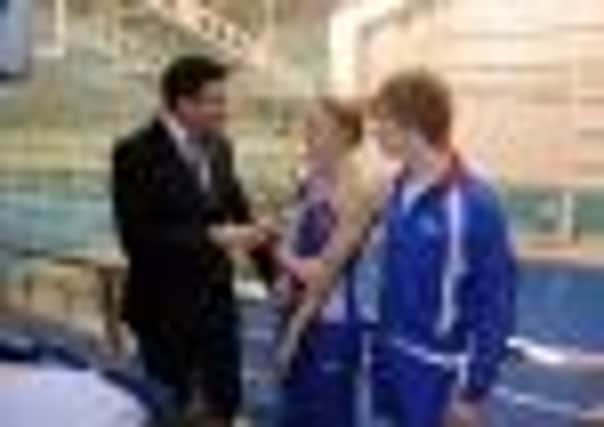Winning tape now in sight for Coe as he nears the end of his biggest challenge yet


As a young man, Sebastian Coe used to run up and down the hills of Walkley and Crookes in Sheffield.
“As anybody will tell you, in Sheffield, everything is uphill from your doorstep,” he says of the hard yards he put in as a Hallamshire Harrier that would serve him so well in a record-laden athletics career.
Advertisement
Hide AdAdvertisement
Hide AdMore than four decades later, and Coe has not stopped running.
From winning 1,500m golds at two Olympic Games in the 1980s, to touring the country beating the drum for the staging of the planet’s grandest sporting extravaganza next summer, Coe’s work is never done.
On Tuesday, in his role as chairman of the London Organising Committee (LOCOG), Coe conducted a whistle-stop tour of the north of England, flying up to Newcastle, then cascading down the country on the rail network with a stopover in Leeds.
His visit to West Yorkshire began at Gledhow Primary School in Leeds where he met pupils who showcased their work on Spirit Alive, a project inspired by London 2012.
Advertisement
Hide AdAdvertisement
Hide AdThen it was onto the John Charles Aquatic Centre, home to the mightily successful City of Leeds diving club that sent six members to the World Championships in China earlier this year.
There, Coe met promising talent Jack Laugher, 16, of Harrogate, and former Leeds Met student Sarah Barrow, who are on course to make ripples in the aquatics centre in the Olympic Park next summer.
“It’s always nice to come back to Yorkshire,” said Coe, his Welcome to Yorkshire blazer badge condensing in the humidity of the pool area, along with the cameras and recording equipment of the media who had congregated to meet him.
“I always find the reaction to the Olympics to be very, very strong here. It’s an area that from the outset always understood the meaning of the Games, and I’m not surprised because Yorkshire has contributed a massive amount to the history of the Olympic Games, performance-wise particularly.
Advertisement
Hide AdAdvertisement
Hide Ad“But it’s not just sport, it’s also the cultural activities. I’ve spent time with some fantastic schools this afternoon, one of them I have just given the ‘Inspire’ brand to for a project which looks across the Olympic Games both in history and in values and really takes it into the classrooms. That’s very exciting when you see a team approach to the Games in schools.”
Coe was born in London and may have returned to the capital to reside, but he was raised in the Steel City, was educated at Tapton and Abbeydale Grange schools and took his first meaningful footfalls as a future world-leading middle distance runner with his local club Hallamshire.
“This is the county I competed for, I feel a very strong affinity here,” he said.
“I did used to run up the hills of Crookes and Walkley, I lived just the other side of Walkley in Broomhill.
Advertisement
Hide AdAdvertisement
Hide Ad“Hallamshire was my club, through a large part of my career. I wore a Hallamshire Harriers club vest the night I broke the world mile record in Brussels in 1981.
“My first coach was from the club and I feel a very strong affinity with it.”
The days of Coe leading the world in running may be long gone, but he has gone on to be just as successful as a sports administrator. He was the driving force behind London winning the right to host the Olympics back in 2005 and remains the face of the administrative side of what is a massive logistical exercise.
With such power comes a great responsibility to be answerable to all issues, and in an Olympic year, sport is often front page as well as back page news.
Advertisement
Hide AdAdvertisement
Hide AdThe issues bubbling under the surface at present are the threatened boycott by the Indian Olympic Committee over the £7m sponsorship of the Games from controversial chemical company Dow.
As well as that, the British Olympic Association (BOA) are locked in a debate with the World Anti-Doping Agency (WADA) over a by-law that bans drug offenders for life, which contravenes WADA’s less conclusive rules.
Ever the politician, Coe responds to the questions diplomatically by hinting at a position without fully committing himself.
“There was never any intimation at all from the Indian Olympic Committee, and I have some very strong and close friendships in the Indian Olympic Committee, that there was ever a question about a boycott,” he says.
Advertisement
Hide AdAdvertisement
Hide AdAnd on the BOA’s drugs stance: “I believe it is important for individual sporting oprganisations to decide on by-laws that are relevant to sport and to those individuals.
“This isn’t an institutional whim, this is supported by 95 per cent of British athletes past and present and it is important that individual sporting institutions set the parameters that they see fit.
“It is not a matter for me to speculate on, but individual sporting organisations should have the autonomy and independence to decide what is in the best interest of their sports.”
And with that, he is off on a train back to his desk in Stratford overlooking the Olympic Park
“We are down to weeks and months to go now,” he says.
“The enjoyable part of the job now is meeting people who are really looking forward to the Games. And that’s very encouraging, given that’s what we always wanted the Games to be about.”